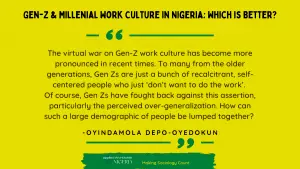In an era defined by rapid technological advancements, the future of work is undoubtedly digital. Across the globe, emerging technologies such as Artificial Intelligence (AI), Blockchain, Virtual Reality (VR), and Big Data Analytics are transforming industries and creating new job opportunities. However, Africa, with its young and vibrant population, faces a critical challenge – the widening digital skills gap. Unless African youth embrace the digital revolution and acquire the necessary skills, they risk being left behind in the race for economic prosperity and career success.
This comprehensive article delves into the pivotal role that digital skills play in shaping the future of work and why African youth must prioritize their acquisition. By exploring the impact of emerging technologies, the current digital skills landscape, and the strategies for empowering African youth, we aim to inspire a paradigm shift and propel the continent toward a brighter, more technologically-driven future.
The Imperative of Digital Transformation
According to the United Nations, Africa is home to the world’s youngest population accounting for over 19% of the global population. With over 60% of its people under the age of 25. This demographic dividend presents an unparalleled opportunity for the continent to leapfrog its development and secure a prosperous future. However, this opportunity can only be realized if African youth are equipped with the necessary digital skills to navigate the ever-evolving job market.
“The future of work is digital, and those who fail to upskill themselves risk being left behind.” – Akinwumi Adesina, President of the African Development Bank.
The rapid advancement of digital technologies is transforming the way we live, work, and do business. Across industries, from healthcare to finance, from agriculture to manufacturing, the integration of emerging technologies is driving innovation, efficiency, and productivity. In this digital age, the demand for skilled professionals who can leverage these technologies is skyrocketing, and Africa must be at the forefront of this transformation.

Emerging Technologies and the Future of Work
Artificial Intelligence (AI) is revolutionizing various sectors, from automating repetitive tasks to powering intelligent decision-making algorithms. Blockchain technology is transforming the financial landscape, enabling secure and transparent transactions. And creating new opportunities in areas such as supply chain management and smart contracts. Virtual Reality (VR) and Augmented Reality (AR) are reshaping the way we interact with digital content. Opening up new possibilities in fields like education, training, and entertainment. Meanwhile, Big Data Analytics is enabling organizations to make data-driven decisions, optimize operations, and unlock valuable insights.
“Africa’s future lies in its ability to harness the power of emerging technologies to drive innovation and economic growth.” – Vera Songwe, Executive Secretary of the United Nations Economic Commission for Africa.
These emerging technologies are not only transforming existing jobs but also creating entirely new professions. From AI and machine learning engineers to blockchain developers, from VR content creators to data scientists, the job market is evolving rapidly, and Africa must be ready to seize these opportunities.
Bridging the Digital Skills Gap
Despite the growing importance of digital skills, many African countries face a significant skills gap. This gap is exacerbated by the lack of access to quality education and training opportunities, as well as the limited investment in technology infrastructure across the continent.
“Investing in digital skills development is not only an individual pursuit, but a collective responsibility that will determine the future prosperity of our continent.” – Aliko Dangote, Founder and Chairman of the Dangote Group
According to a report by the International Finance Corporation (IFC), Africa’s digital skills gap is projected to reach 4.3 million jobs by 2030, if urgent action is not taken. This gap not only hinders the continent’s ability to compete in the global market but also limits the potential for economic growth and social transformation.
To address this challenge, governments, educational institutions, and the private sector must work together to create comprehensive digital skills development programs. This includes investing in STEM (Science, Technology, Engineering, and Mathematics) education. Offering vocational training in emerging technologies. And fostering entrepreneurship and innovation ecosystems that nurture digital talent.
Empowering African Youth for a Brighter Future
By embracing digital skills, African youth can unlock a world of opportunities. They can become innovators, problem-solvers, and entrepreneurs, driving economic growth and social transformation. Moreover, digital skills can enhance their employability, enabling them to thrive in the rapidly evolving job market.
“The future belongs to those who are willing to adapt, innovate, and embrace the digital revolution.” – Ngozi Okonjo-Iweala, Director-General of the World Trade Organization
The benefits of investing in digital skills go beyond individual career success. When African youth acquire proficiency in emerging technologies, they can contribute to the development of homegrown solutions that address the continent’s pressing challenges. From healthcare to agriculture, from infrastructure to education. By harnessing the power of digital tools and platforms, they can create innovative startups, build sustainable businesses, and drive Africa’s digital transformation.
Furthermore, digital skills can empower African youth to participate in the global digital economy. Access remote work opportunities and tapping into lucrative international markets. This not only expands their career horizons but also contributes to the overall economic prosperity of the continent.
Strategies for Empowering African Youth
To bridge the digital skills gap and empower African youth, a multifaceted approach is required. Governments must prioritize investment in digital infrastructure. And ensure universal access to the internet and modern technologies. Educational institutions should integrate digital skills training into their curricula, from primary to tertiary levels, and collaborate with the private sector to develop industry-relevant programs.
The private sector, on the other hand, can play a pivotal role in upskilling the workforce by offering training programs, internships, and apprenticeships in emerging technologies. Multinational corporations and technology giants should also consider establishing research and development (R&D) centers in Africa, fostering innovation and knowledge-sharing within the local ecosystem.
Furthermore, initiatives such as coding boot camps, online learning platforms, and digital skills accelerators can provide accessible and affordable pathways for African youth to acquire the necessary skills. These programs should be tailored to the unique needs and challenges of the continent, ensuring that they are culturally relevant and widely scalable.
Conclusion
As Africa stands on the precipice of a digital revolution, the time for African youth to invest in digital skills is now. By equipping themselves with the necessary skills, they can secure a brighter future, not only for themselves but for the entire continent. The path to prosperity is paved with digital proficiency, and African youth must seize this opportunity to unlock their full potential and lead Africa into a new era of growth and innovation.
The digital age presents a transformative moment for Africa, and African youth must be at the forefront of this transformation. By embracing emerging technologies and acquiring the requisite digital skills, they can position themselves as the drivers of Africa’s digital future, contributing to the continent’s economic and social development, and ultimately, securing a more prosperous and inclusive tomorrow.





